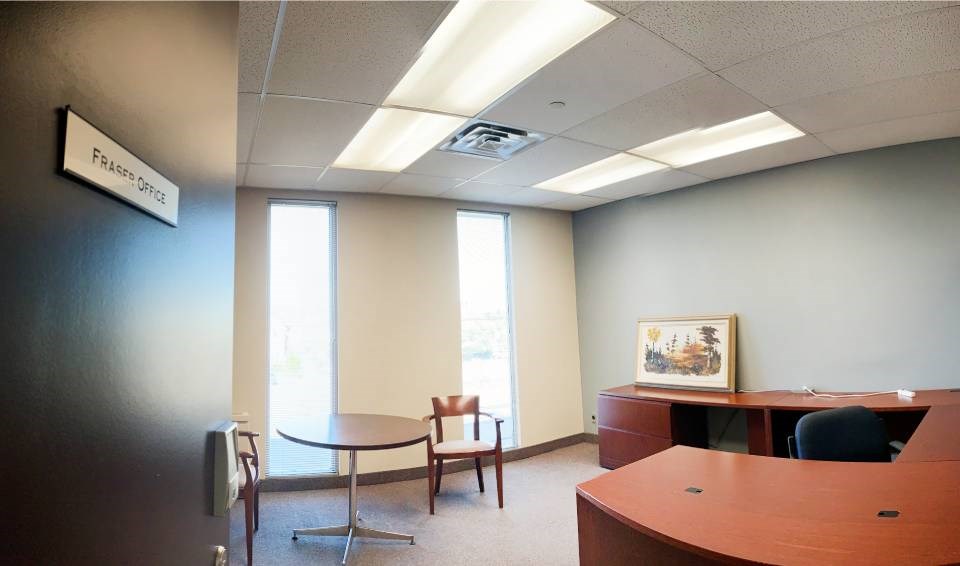Even before the arrival of COVID-19 in the North, Tony Limina had watched with interest as coworking spaces rose in popularity.
The shared working environments, which first took off about a decade ago in large, urban centres like Toronto, were starting to permeate smaller communities, too.
After early pandemic lockdowns sent many workers home, where they fashioned makeshift desks out of everything from dining room tables to ironing boards, Limina decided the time was right to establish a coworking space of his own.
Figures from a May 2021 survey by KPMG indicating that 77 per cent of the workforce wanted the flexibility of working in a hybrid office-home model seemed to support his view.
"That seems to be a trend that is moving forward, and if that's the case, you always want to be prepared for these future trends so you can offer the kind of flexibility that people are looking for,” said Limina, a co-owner of KenGap Holdings Inc.
In September, he opened KennedyWorks, a coworking space in downtown North Bay that's designed to cater to small-business owners, startups, freelancers and contract workers, and business travellers who may only need an office for a day or two at a time.
“I think there's a lot more gig workers out in the workplace right now, and as a result of that, some of them may not want to work from their house and would prefer to have that type of environment that they're secure, in the fact that it's a standalone place for them and it's got all the COVID protocols in place, and it's got the internet capability so they don't have to utilize their own storage service that they have,” Limina said.
Want to read more business news from Northern Ontario? Subscribe to our newsletter.
Prior to the pandemic, the Kennedy Building was at capacity, he noted.
But as provincial shutdowns closed offices last spring — temporarily at first, and then for extended periods — many of his long-time tenants didn't return, leaving him scratching his head on a way to fill the space.
After a few upgrades, the construction of a kitchen, and the addition of some furniture, it took on its new identity as a coworking hub.
Taking up one entire floor of the building, KennedyWorks encompasses six offices, a boardroom, a small kitchen, and a shared waiting area, along with access to a shared bathroom.
The offices range in size from 96 square feet to 202 square feet, with the 259-square-foot boardroom able to seat six around the table comfortably.
Offices can be rented by the day, the week, or the month. One client has rented an office for a full year, Limina said. Another rented an office to host a webinar, because the building had better internet capabilities than she had at home.
Though some coworking spaces are set up as open-concept rooms where clients intermingle and network freely, each office at KennedyWorks is a private space with a locked door, so clients can come and go freely throughout their stay without worrying about anyone else accessing the space.
"That's why we purposely wanted to go with this particular office setup, because there was that security of knowing full well that, when you rent one of our spaces, you're renting a space that is just for you, and that you don't have to deal with anyone else, quite frankly,” Limina said.
This is just the latest transition for the office building, which was the first structure of its kind to be erected in North Bay.
Dating to the late 1960s, the five-storey, 65,000-square-foot multi-use building was originally owned by a group of siblings based in North Bay, who retained ownership until the 1970s. A Barrie-based commercial property management firm took over, keeping it in their portfolio for about a decade before high interest rates and financial trouble prompted the company to sell.
Limina and his partners became the third owners in its history when they banded together to save the building.
"We basically bought the building out of bankruptcy out of the late '80s, early ’90s, and we took it over then,” said Limina, emphasizing that KenGap remains invested in the community for the long term.
If the coworking model proves successful, Limina said, there are other areas of the building that can be transformed into a similar setup, while others are better suited to a more traditional coworking design.
In his circle of business associates, he said, many companies remain undecided about how they’ll go forward following the pandemic: will a conventional, professional office setting be the way to go, or will more embrace the working-from-home model?
Limina believes the answer will likely be a hybrid version or something in between.
“There are some businesses that have already said, no, we’re going to expand our footprint because we need the setting of a professional office, and they’ve done that, and we’re seeing expansion there,” he said.
“But I think the flexibility option, the hybrid model, is the one that most businesses will go to.”




